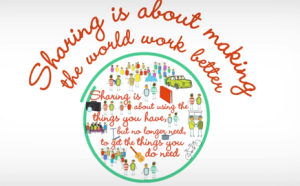The Sharing Economy is a latest concept and has become an increasingly important aspect of global enterprise. Once seen as fruitless, developments in technology have led to increased efficiency in shared information and partnership. As mobile computing and cloud services become more established, the scale and scope of the sharing economy will certainly grow.
In 2011, an international magazine described the sharing economy as an idea that will change the world. While the majority of the sharing economy has nothing to do with sharing rather, it’s motivated by Profit or Cost Cutting. The success of the sharing economy lies in its ability to rearrange under-utilized resources to more efficient use.
SHARING ECONOMY AT A GLANCE
Sometimes called the Peer-to-Peer (P2P) economy, the sharing economy is a decentralized economic system defined by collaboration between individuals and the sharing of resources. Monetary and barter transactions are used in the sharing economy, and both for-profit and nonprofit bodies participate in the system. Although many sectors operate within the modern sharing economy, it is largely technology driven highlighting especially on Internet-based services.
The sharing economy shouldn’t be confused with socialism because sellers of products and services may be profit driven. At the same time, buyers or users of the sharing economy want to reduce costs and may not expect to obtain goods or services for free. Another distinction is that the ownership of the means of production and of the final good may lie with the producer or made a public good for all to utilize.
SOLUTION TO THE TRAGEDY OF THE COMMONS
One criticism of capitalism is the so-called “tragedy of the commons,” whereby individuals pursuing to maximize their own well-being will neglect the well-being of the larger society. If we imagine today’s limited common resources are network storage, computing capacity and bandwidth. The sharing economy is often seen as a way to reduce the tragedy of the commons as it applies to the limited nature of contemporary technology.
SHARING ECONOMY ACCOMPLISHMENT
The sharing economy is comprised of many fragments. P2P marketplaces exist to bring together individual buyers and sellers directly. This two-sided marketplace is often maintained by a third party that charges a fee for facilitating transactions between buyers and sellers and reducing transaction risk. Popular examples of such marketplaces are OLX, Zameen, Pakwheels etc. all which allow buyers and sellers to interact directly. Other sectors of the sharing economy include open-source software, where the computer code for software projects can be viewed and altered by any interested party at no cost. In Pakistan this concept has been applied with technology now facilitating the efficient sharing of transportation, such as UBER.
These examples are just a small piece of the current state of the sharing economy. As it grows, individuals may find it easier to personally own less and less, and the world will be forever changed. For example, if, in the near future, people can use a mobile app to call a driverless car that will take them anywhere for little cost, car ownership will no longer be a necessity. At the same time, the number of car accidents causing property damage, injury or death will drop forcing insurance companies of automobiles towards reconsideration of their businesses.
THE END PRODUCT
Sharing’s role within the global economy has grown immensely. Collaboration and the free flow of real-time information and media content will modernize the way we do business and unsettle businesses that fail to acclimatize. The sharing economy is already branching into many different aspects of the economic system. The overall feeling is that regulators will be forced to adapt to the changing environment.
 Bloggers Trend Keeping You Up To Date
Bloggers Trend Keeping You Up To Date







